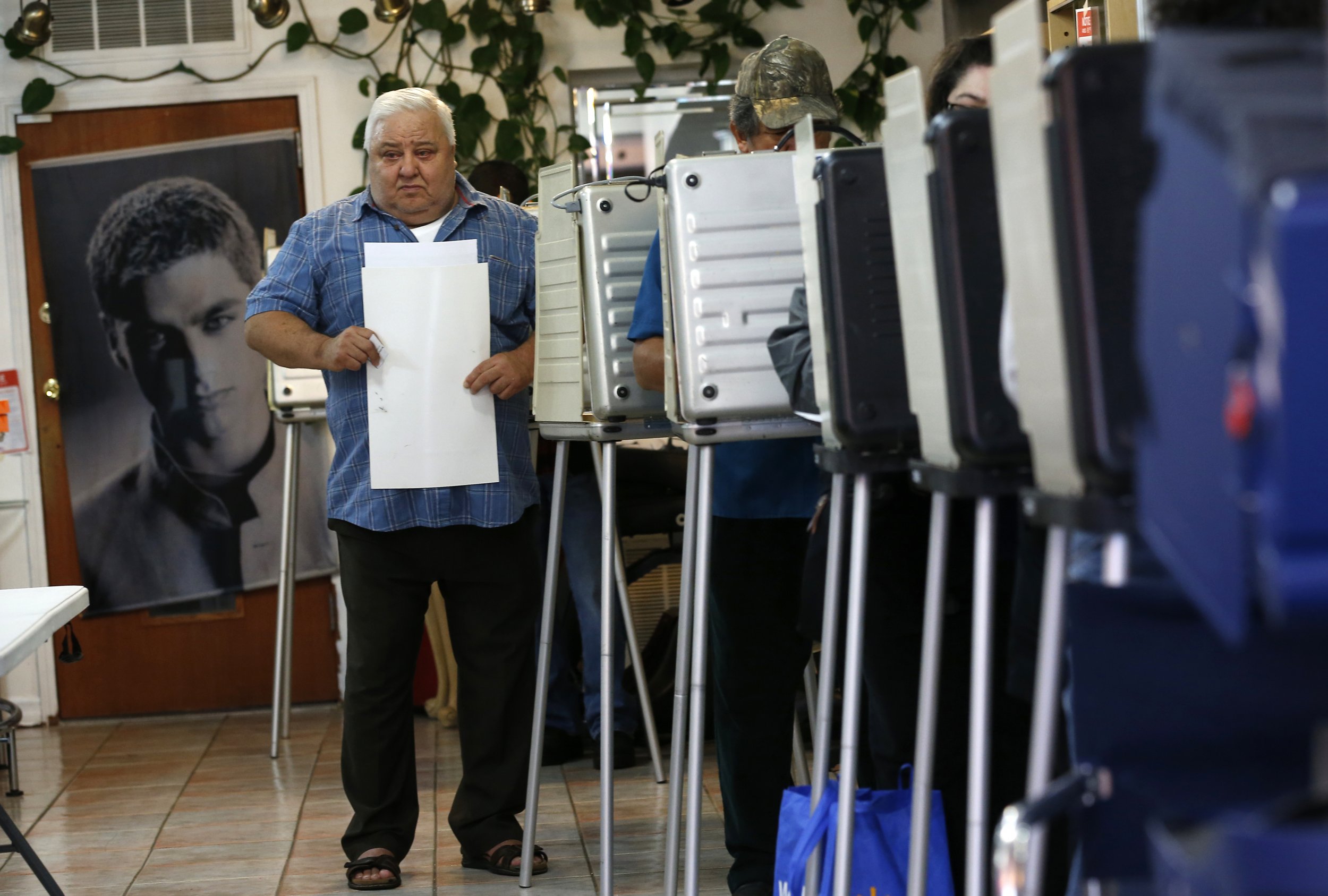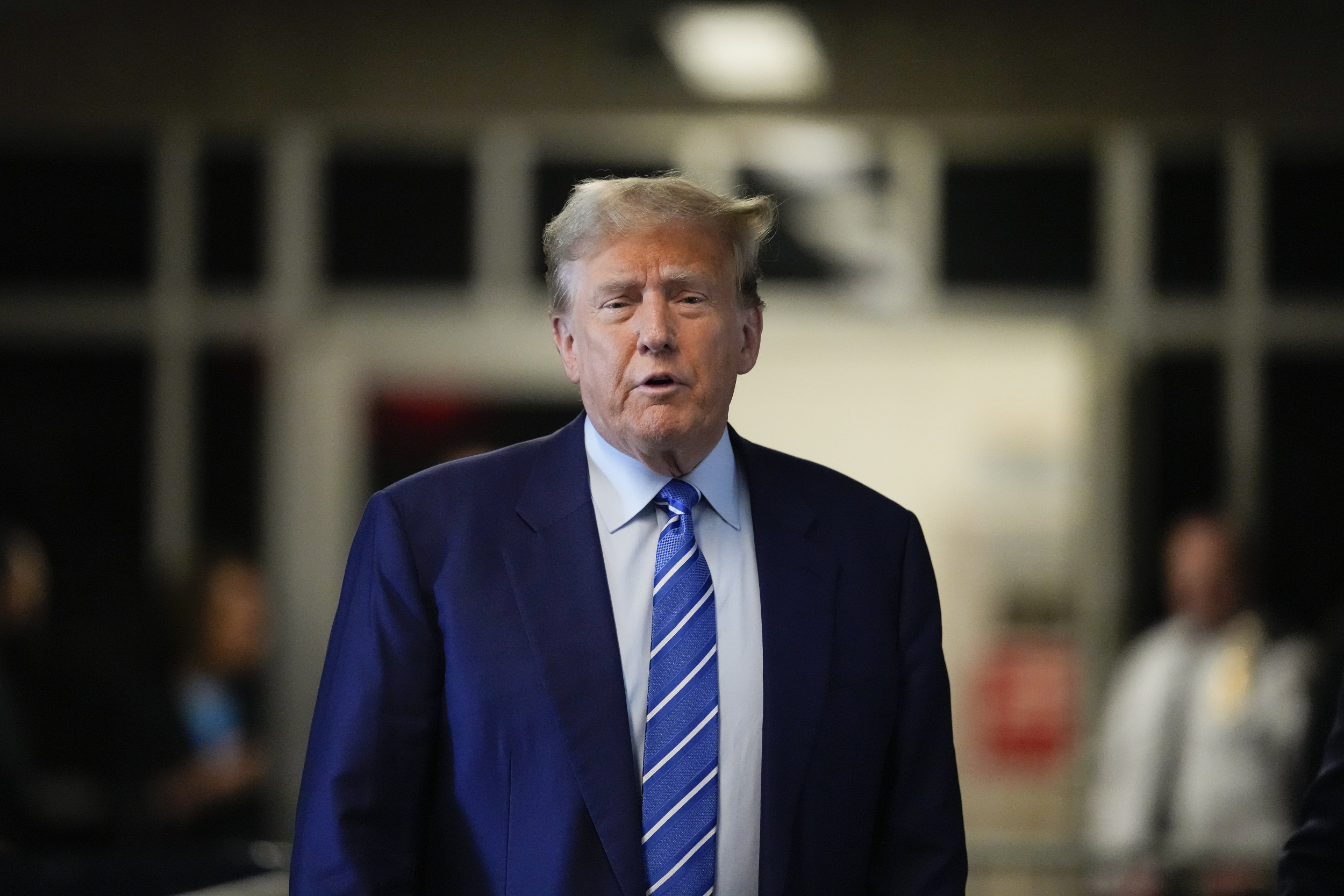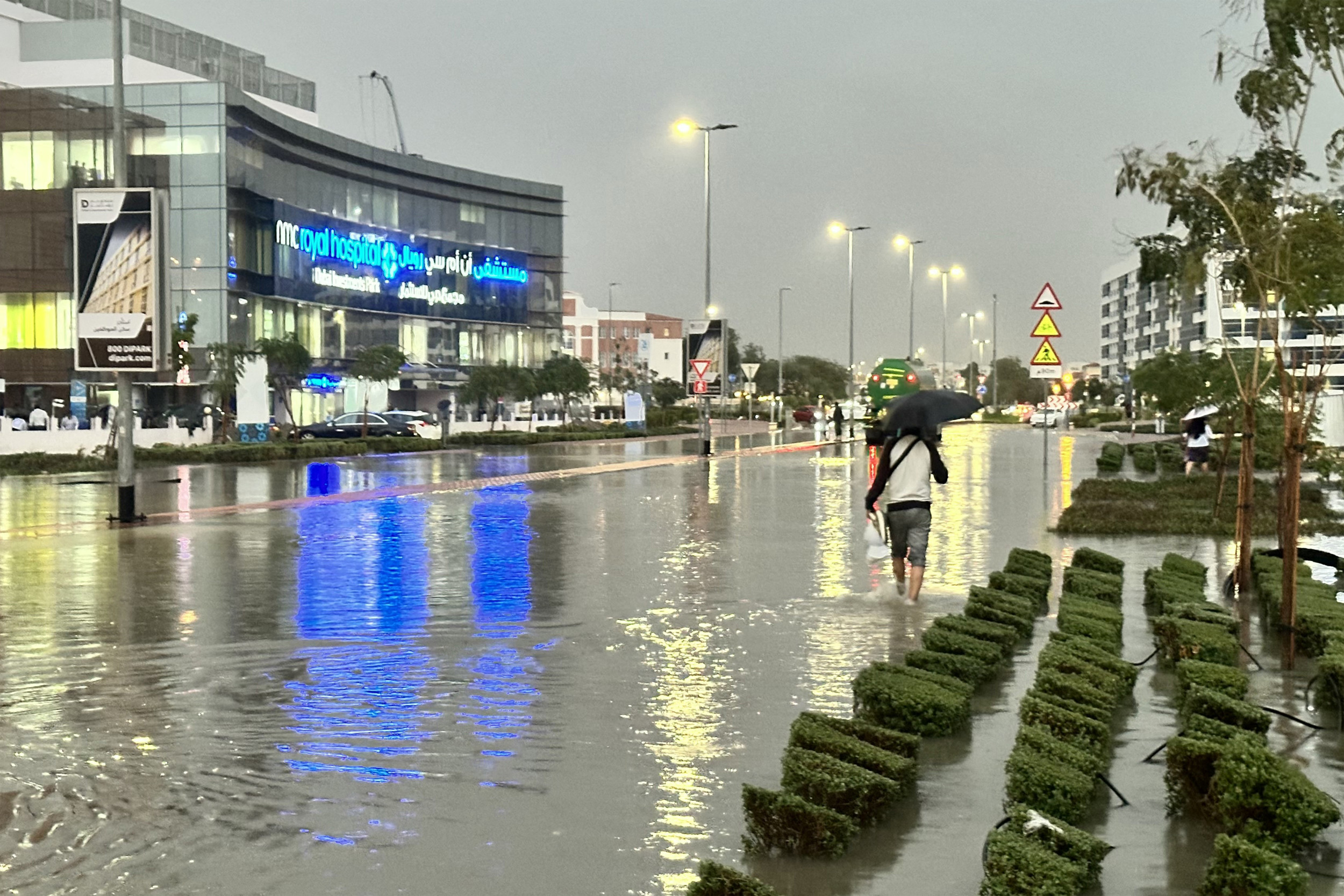
Quora Questions are part of a partnership between Newsweek and Quora, through which we'll be posting relevant and interesting answers from Quora contributors throughout the week. Read more about the partnership here.
Answer from Brad Porter, political watcher, writer:
How can Democrats credibly debunk claims that undocumented voters regularly vote? I consider William Murphy's answer to be pretty definitive here. That being said, I want to add one more answer to the pile as a sort of appendix, because it has been driving me nuts, and because it is a fundamental misunderstanding that I believe is at the heart of many people's views on the subject. Namely: registration mistakes are not voter fraud.
I can't tell you how many times I have heard people talk about this issue that seem to not understand or realize that very, very basic point. Even the president and his press secretary very clearly do not realize the distinction, or even that there is one, and even journalists who follow up rarely make it clear. You'll hear them often say "there is no evidence of voter fraud" and that is true, but they very rarely point out why the people talking about voter fraud are mistaken—that is to say, they rarely clear up the very basic and obvious factual mistake being made. My hunch is that many readers of this post, right now, may not even realize that they're mistakenly conflating two completely different things.
Specifically: when people are casually making reference to dead people being registered to vote, or people being registered in different states, or things of that sort, they are conflating that with voter fraud. They are taking the (mostly accurate) number of registration mistakes and talking about them as if they are fraudulent votes cast. I have seen an awful lot of people jumble these things together, and it is not at all clear to me that they realize it. For instance, I think that Donald Trump just plain doesn't understand that when he hears a figure about thousands or millions of mistaken registration, these are not actual votes being cast. He conflates the two things, not out of malice but just out of lazy ignorance. I have had similar experiences with lay voters. I really do believe that the reason both sides are often talking past each other is because they're both using the same words and meaning different things. Most people convinced that vote fraud is an actual problem in this country do so simply because they are misunderstanding basic facts.
So, to be very clear:
Fraudulent votes
Fraudulent votes are when a person actually votes despite not being eligible, or a person somehow becomes an eligible voter through fraud and then actually votes, or a person who tries to vote by fraudulently claiming to be somebody else (who, presumably, IS eligible to vote). This is what most people mean when they talk about illegitimate voting, the sort of activity that can actually affect the outcome of an election. These would be actual votes cast or attempted to be cast. A subset of this would be fraudulent votes of the "stuffing the ballot box" variety when a person, typically an election official, literally invents ballots to include or otherwise manipulates the vote count itself.
This is, we know, something that happens very, very, very rarely in America. While there are some historical examples (particularly of the "stuffing the ballot box" type), in this day and age illegal, fraudulent voting of this type barely occurs at all—it is very well documented that out of tens of millions of votes cast any given election year, you may get a dozen (often less) that are just flat-out illegitimate. This is not an opinion, this is a fact. Does it happen? Sure. But with such minuscule regularity that it's not really an issue. And even in the vanishingly few actual cases of people casting an improper ballot, it's usually not some nefarious attempt at fraud, but someone who is senile/crazy or just confused/mistaken. Again, this is not really an "agree to disagree" political argument—these are basic facts, available to anybody who cares. But, when someone claims that there were "millions of illegal votes/voters," this is what they either explicitly mean or are implying.
Mistaken registrations
A totally separate category is mistaken registrations. This is voter registration information that is inaccurate or not up to date. Often times, when you hear people offhand refer to dead people voting, or people being registered to vote in two states, what they are actually referring to is this.
However, registrations are not votes. If you have 500,000 dead people registered to vote, this actually does not affect an election in any way, unless somebody showed up at the polling place trying to vote in that dead person's name (which, again, almost never happens, and which if it did, would be hard to pull off and astronomically harder when you're talking about numbers that would actually affect an election outcome). But the registration itself doesn't "do" anything—it does not represent a ballot cast. Now, in theory, yes, if a person is registered (incorrectly, for whatever reason) as a name and an address, and then a person showed up at the right polling place claiming to be that name and that address, then that person could theoretically cast a vote. But—really can't stress this enough—that almost never happens, for a wide variety of reasons.
But for the most part, mistaken registrations are not a function of somebody illicitly gaming the system. Rather, it's just administrative noise—when you're dealing with literally every registered voter in America, you're going to be working off a massive list of people that will constantly have wrong information in it (and there is no single database of all citizens that includes all information in the way you'd have, like, a single Blockbuster video account—rather, there's a whole bunch of different lists and databases specific to the agencies or organizations using them, and they don't always necessarily talk to each other well). That's just the way it is—it's true for credit card companies, it's true for the IRS, it's true for the police, it's true for your alma mater, it's true for your magazine subscriptions, it's true for anybody. Simply put: if you have a name and address for every registered voter in America, you're going to try your hardest to keep it updated regularly, but it's logistically impossible to have it updated 100% in real time. So as people die or move or change their name or whatever, you're going to have information that constantly falls out of date and has to be periodically cleaned up.
Keep in mind, there is no automatic process wherein every time you move your voter registration automatically updates. You either have to manually update that information yourself, or the people tasked with keeping voter data have to find it out some other way, for instance as you update your driver's license or as mail gets returned or whatever.
I myself moved to Vermont straddling the election. I was a registered voter in Philadelphia in November, then I moved to Vermont. Now that I'm here, I'll register to vote in Vermont, but that doesn't automatically de-list me in Philadelphia. Eventually, the Pennsylvania folks will see that I registered in Vermont and will take me off their voter rolls, but for awhile I'll be registered in two states. There's nothing nefarious going on, and it certainly doesn't mean I'm VOTING in two states—it's just a function of me moving and that it'll take awhile for all government and private records to catch up to that fact. Same if I were to die—there's no daily alert that goes out to every federal agency or private business saying "Brad Porter, SSN #XXX-XXXX, of Philadelphia, PA just died—please update all your records accordingly." It'll take awhile for that information to work its way through the system. It does not mean Zombie Brad Porter will be voting or renting movies or whatever.
Important as well to understand that this usually isn't a VOTER mistake—i.e. it's not someone deliberately registering in a fraudulent way. It's just the byproduct of dealing with massive data sets of ever-changing information. It's more akin to a booking error than it is to a crime. It's the same way the IRS has to spend tens of millions of dollars every year trying to keep their data up to date, comprehensive, and accurate—but that is not because a bunch of dead people are actively filing taxes.
As Trump and Sean Spicer and others merrily went around claiming that "millions" of people voted illegally, what they were ACTUALLY talking about was this. They kept citing a Pew Study that they claimed backed them up: here is that Pew Study. You'll note, right off that bat, that the study makes no claim whatsoever pertaining to actual votes cast anywhere—it is simply talking about how our data cleanup processes for elections is out of date and could be improved (which is true for basically all government databases to one extent or another). It's perfectly valid, but not very sexy—it's basically saying we should invest more in our voter registration system to get our data and records management processes more efficient. That's it. The sort of humdrum administrative white paper that would normally merit no attention whatsoever outside of the people intimately interested in the ins and outs of the actual process.
So the topline of that study was:
- Approximately 24 million—one of every eight—voter registrations in the United States are no longer valid or are significantly inaccurate.
- More than 1.8 million deceased individuals are listed as voters.
- Approximately 2.75 million people have registrations in more than one state.
Again, this is to be expected, and while it indeed a problem that merits fixing (by investing more money in the system), it is relatively uncontroversial and the actual impact it has on elections is slim to none. It just makes them more of a pain in the ass to administer.
But for some reason, Trump was apparently told about this study, and his misunderstanding was that millions of deceased person VOTES were cast or millions of people VOTED in two different states. And this is simply, completely, and verifiably not true—and the evidence he bases this claim on is talking about something else entirely. This is a very basic, very fundamental category error, that literally 30 seconds of followup clarification rectifies. But it is clear that he just flat-out doesn't understand the distinction (and doesn't particularly care, anyway). In followups with journalists, this is very evident:
He even does it live on air:
"You have people registered in two states," Trump said. "They're registered in New York and New Jersey. They vote twice."
And yet, that second sentence doesn't follow from the first. At all. Again, this is not a matter of opinion or a political argument—he is just flat-out wrong and doesn't understand what he's talking about. This is not even a case of him being deceptive, I don't think—he literally just does not understand.
Trump himself is not a very smart guy who frankly has never cared very much about informing himself on subjects, but I also see this same sort of categorical error repeated ad naseum from others who should know better but for some reason don't, and then there are many more that do know better but find it convenient to blur the lines between these two things.
So, I think the answer to your question—How can Democrats credibly debunk claims that undocumented voters regularly vote?—is that we have to clarify what people think they mean when they're making these claims. A majority of the time, at least in my experience, these claims come from people that literally just don't understand or haven't cared to think about the difference between registration mistakes and fraudulent votes. In their mind, those are the same things. The best way to debunk those claims is to simply ask a followup question or two, and you can usually see pretty quickly who is at least trying to make a valid point, and who is just parroting back some thing they vaguely heard and don't actually understand, which is very often the case.
It's sad that it's mostly that latter category that is driving changes to enfranchisement in America, but…well, it is.
How can Democrats credibly debunk claims that undocumented voters regularly vote? originally appeared on Quora—the place to gain and share knowledge, empowering people to learn from others and better understand the world. You can follow Quora on Twitter, Facebook, and Google+.
More questions:
- Voting: Why are the Democrats so against strengthening voting procedures?
- Democratic Party: Why did the Democrats fail so badly in the November 2016 elections?
- Politics of the United States of America: Why are the protests against Trump so important?
Uncommon Knowledge
Newsweek is committed to challenging conventional wisdom and finding connections in the search for common ground.
Newsweek is committed to challenging conventional wisdom and finding connections in the search for common ground.
About the writer
To read how Newsweek uses AI as a newsroom tool, Click here.








